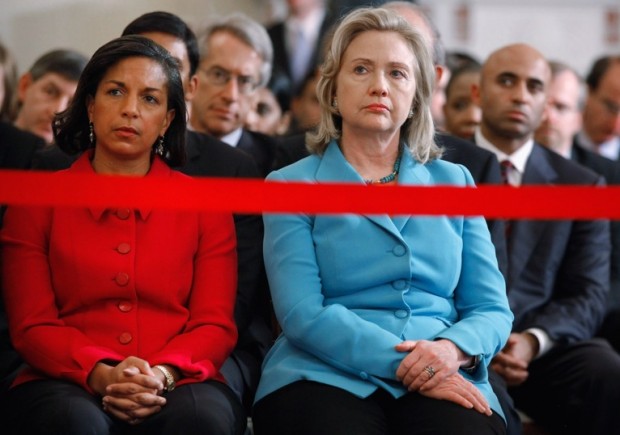Special to WorldTribune.com
We may never get to the end of the Susan Rice story.
History tells us that Rice rattled off a false tale on several networks after the attack and death of Four Americans – including the ambassador to Libya — in the Benghazi. Her detailed lie was that the deaths were the result of a semi-spontaneous anti-American demonstration occasioned by broadcasts from the then pro- Muslim Brotherhood broadcasts from radio Cairo that had spread throughout the Arab and Moslem world.

The truth was, of course, that the Libyan jihadists had plotted to kill Americans for some time, that the local U.S. diplomatic corps had been pleading unsuccessfully for weeks for additional defenses against what it knew were plots against them. Although Rice’s performance was almost immediately exposed, she suffered no particular consequences and continued as a high national security official.
The Rice story has barged into the headlines again with the revelation that she “unmasked” American citizens who, presumably, were only incidentally recorded in secret U.S. intelligence agencies’ search of communications for important leads. Theoretically such persons were protected unless specific requests were made for their identity by Administration officials, presumably because they would lead to further insights on the principal target of the surveillance.
When word eked out that Rice had been responsible for “unmasking” some of these names, she initially denied the role. But, again, she has backtracked and admitted that it was she who unasked some of these conversational participants. Why? is not yet to be explained since theoretically she was only a recipient of intelligence as she served as the 24th United States National Security Advisor from 2013 to 2017. It was in this role as a consumer of intelligence that she had access to the surveillance but theoretically had no authority except in unusual circumstances to direct its contents, a role for the several American intelligence agencies who produced the material for the president’s office to examine.
What is still at issue is whether having “unmasked” various U.S. persons who fell into the hands of the surveillance teams, she passed this material on to others in the Obama Administration, perhaps to be used against the Republican candidate in the run up to the presidential election last fall.
Rice says she did no such thing, but given her record of stretching the truth, there is considerable speculation that is precisely what she did do.
It is here that we begin to enter the territory of does the punishment fit the crime?
Much too often recently, in “the swamp” in Washington that Donald Trump says he was elected to drain, there has been no penalty for either skirting the outer reaches of the law or, indeed, breaking it.
Instead, American public and private life has fallen into the speech formula of “taking responsibility” for the infraction. That epithet has moral and propaganda implications but it does not actually penalize the miscreant.
In most cases, he [or she] either does not pay the price in dollars and cents for his failure to conform to the law nor does he surrender privileges and prestige that surround the position that has been violated.
The most notorious example, of course, is Hillary Clinton’s use of her private e-mail [for whatever reason] to move official documents, which among other things increased their exposure to foreign espionage.
In both these instances of outright violation of the law, Hillary Clinton has announced that she “takes responsibility” for these missteps. But she has paid no other price.
This new version of the formula “I take responsibility” but requires no actual pain or suffering — either in prestige or in wealth – has eroded the whole concept of right and wrong in public life. It may be too late to fill the widening gap. But an effort ought to be done to take up this responsibility.
Sol W. Sanders, ([email protected]), is a contributing editor for WorldTribune.com and Geostrategy-Direct.com.

